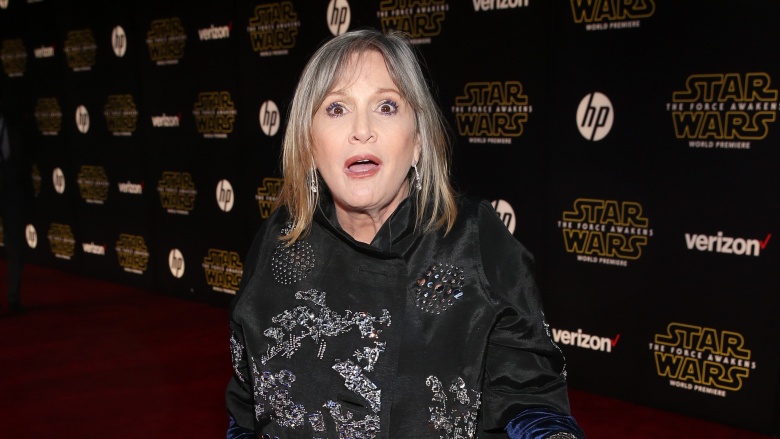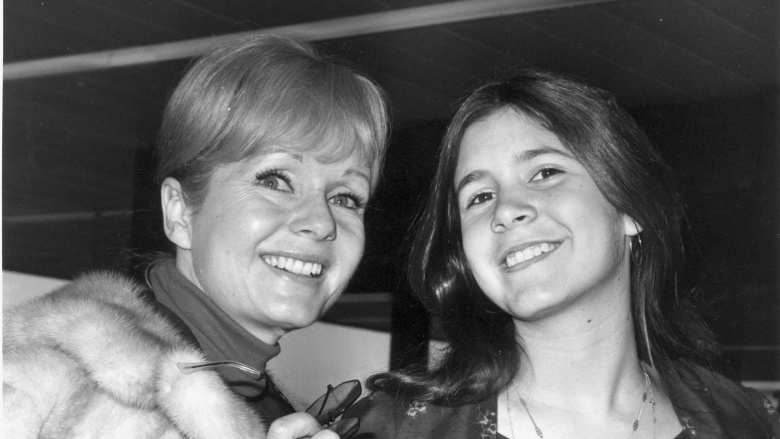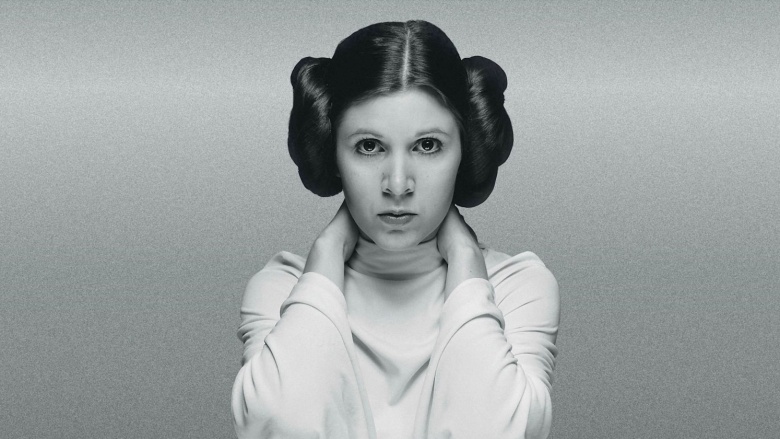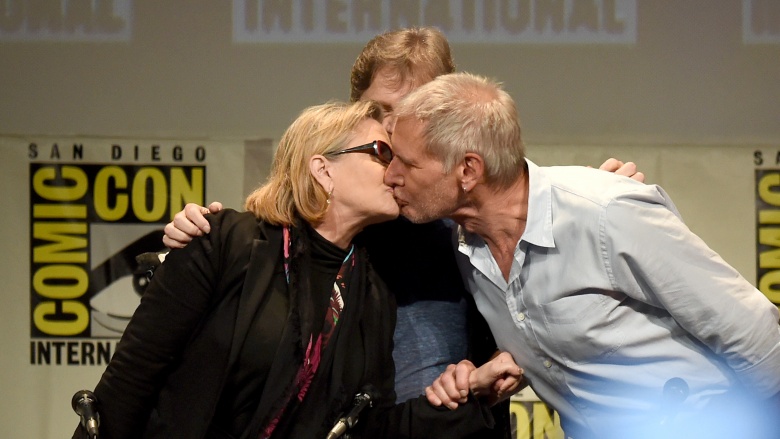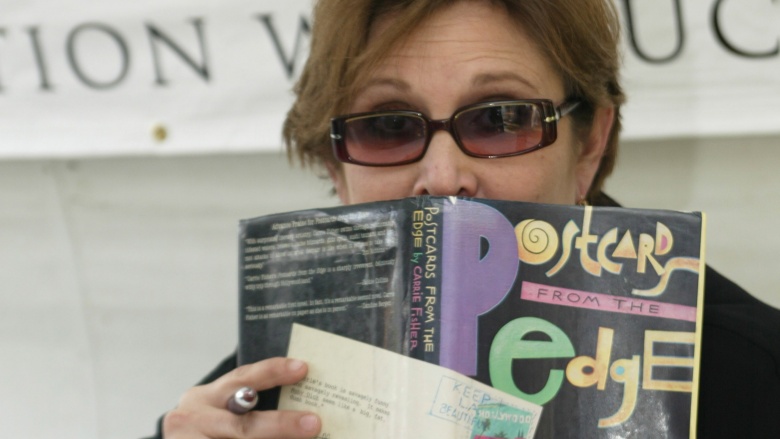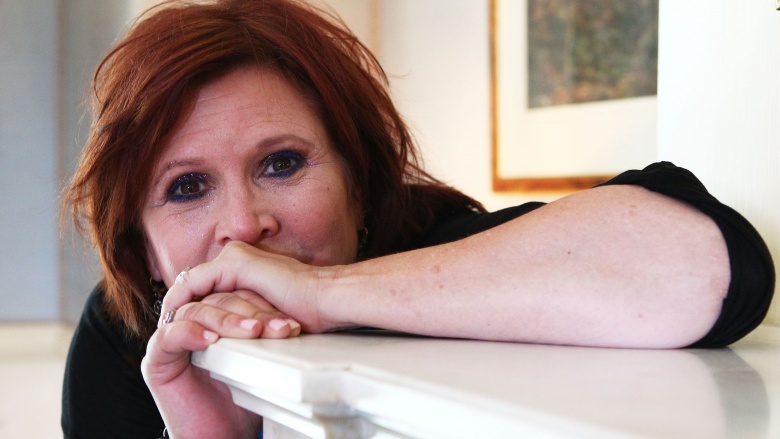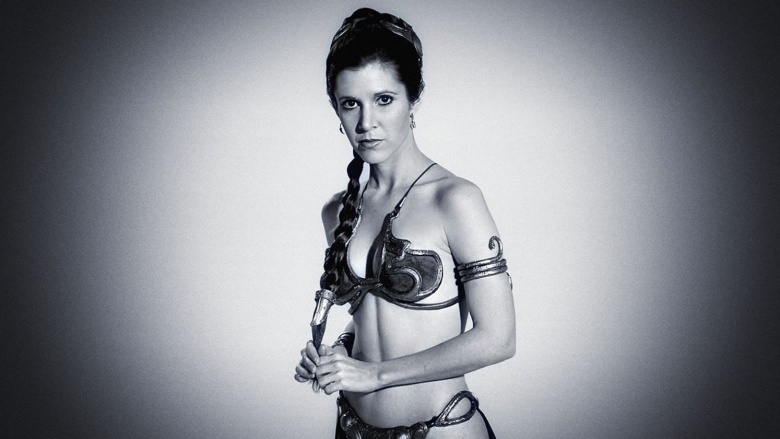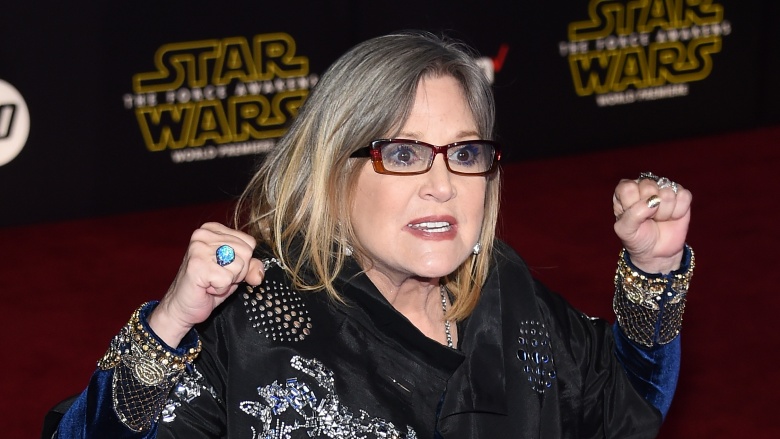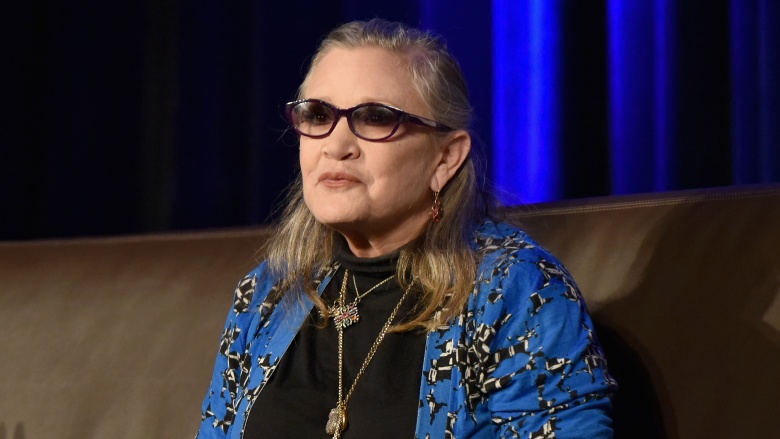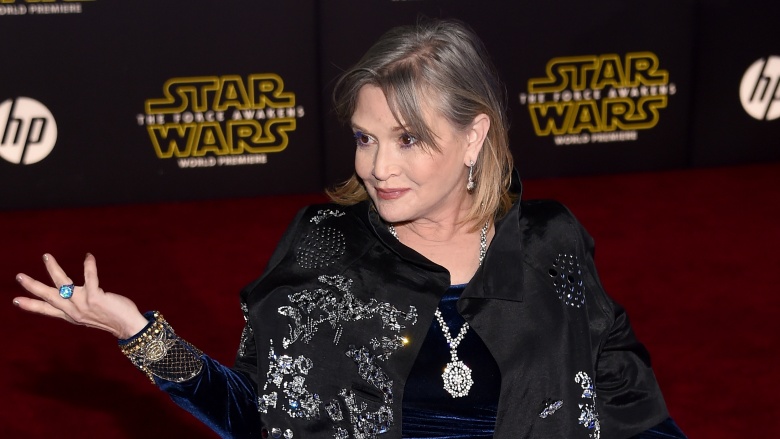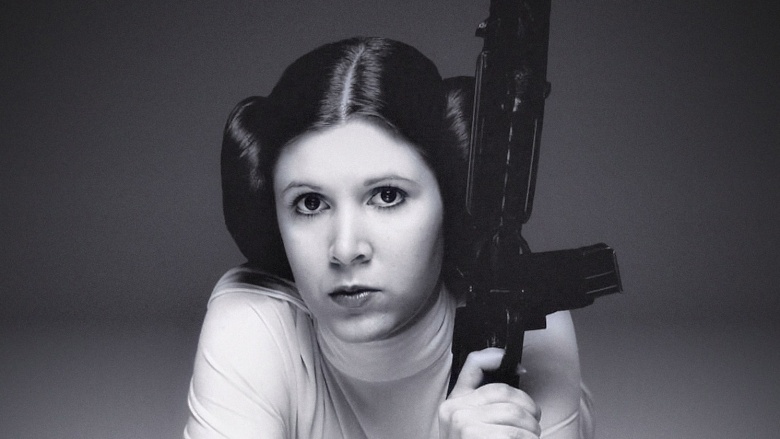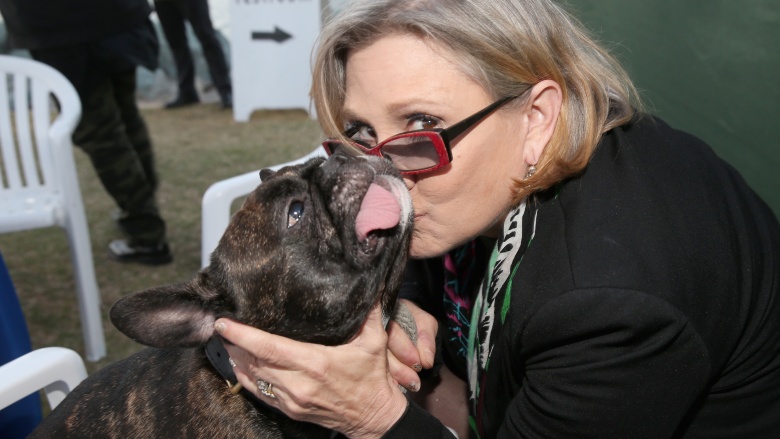The Untold Truth Of Carrie Fisher
We may receive a commission on purchases made from links.
On Dec. 27, 2016, Star Wars icon Carrie Fisher passed away at age 60 after suffering an in-flight cardiac emergency four days prior. For fans around the world, Fisher's death was a devastating blow. More than just a fictional sci-fi princess, the actress inspired millions with her talent, brilliance, humor, and compassion. Let's take a look back at her life and some of the many reasons she came to be loved by so many.
'Drowned in moonlight'
Over the years, Fisher became known for her sense of humor, and she often used her dry wit to poke fun at life's absurdities. As she explained to the Herald-Tribune, "If it's not funny, then it's just true and that's unacceptable, so it better be funny."
In Wishful Drinking, a one-woman show that Fisher later adapted into a book, she shared a hilarious anecdote involving Star Wars creator George Lucas and Princess Leia's famous white dress. "George comes up to me the first day of filming and he takes one look at the dress and says, 'You can't wear a bra under that dress,' Fisher recalled (via Vanity Fair). She asked him why. "And he says, 'Because...there's no underwear in space.'" Fisher explained Lucas' reasoning: "What happens is you go to space and you become weightless. So far so good, right? But then your body expands??? But your bra doesn't—so you get strangled by your own bra."
"I think that this would make for a fantastic obit," Fisher quipped. "I tell my younger friends that no matter how I go, I want it reported that I drowned in moonlight, strangled by my own bra."
Funny girl
Fisher's friends also appreciated her wicked sense of humor, especially when it came to the hilarious gifts she would send them. In a tweet following her death, English comedian and actor Stephen Fry shared a photo of the last three gifts she'd sent him: a Jane Austen action figure, the "Dick-orette" patch for sex addicts, and a particularly vulgar sticker.
Fisher often turned to humor to describe her life with bipolar disorder. In her memoir, Wishful Drinking, Fisher wrote, "I'm a PEZ dispenser and I'm in the abnormal Psychology textbook. Who says you can't have it all?" When WebMD asked her about being a "poster child" for the condition, she told them, "Well, I am hoping to get the centerfold in Psychology Today."
Famous before birth
Fisher was the firstborn of a Hollywood power-couple: actress Debbie Reynolds and singer Eddie Fisher. There was so much public interest in their relationship that Carrie made the front page of the Los Angeles Times before she was born. As a child growing up in the spotlight, she turned to books to cope. "I was a freaky kid. I loved language and I would read all these books," she told Rolling Stone. "I was just in love with words and they saved my from a lot of stuff. Books were my first drug. They took me away from everything and I would just consume them." Carrie's childhood grew more difficult after her father left when she was 2 years old, leaving Reynolds for family friend and fellow actress Elizabeth Taylor.
Carrie entered the family business at age 13, joining her mother's nightclub act and later appearing on-stage alongside Reynolds in the Broadway revival of Irene. Soon after, Carrie made her film debut in Shampoo (1975), alongside Warren Beatty.
Lunch with monsters
During the casting process for 1977's Star Wars, Carrie Fisher was up against some heavy-hitting Hollywood actresses for the part of Princess Leia, including Jodie Foster and Amy Irving. Archival footage of some of her audition tapes have made their way onto YouTube, where you can watch a 19-year-old Fisher absolutely kill an early script reading opposite Harrison Ford. Watching the video today, it seems obvious she was perfect for the part, but Fisher wasn't so sure. After her audition, she didn't hear anything for a few weeks and assumed Foster had landed the role. Sizing up the situation with her typical aplomb, Fisher later recalled in The Making of Star Wars, "I thought, well, I'm not going to get to have lunch with monsters." Thankfully, Lucas took a chance on Fisher, and the rest is history.
Unlucky in love
Fisher would be the first to tell you she's "not good at relationships." In her 2016 memoir, The Princess Diarist, she admitted to having an "intense" affair with Ford on the set of the first Star Wars film. A passionate romance and short marriage to Paul Simon ended in divorce, but the pair continued to date off-and-on for a decade after their divorce. During one of the "off" periods in her relationship with Simon, Fisher dated and was briefly engaged to co-star Dan Aykroyd while filming The Blues Brothers (1980). Fisher later became involved with Hollywood talent agent Bryan Lourd, and while the couple never married, they had a daughter together in 1992—Fisher's only child, Scream Queens actress Billie Lourd—before breaking up in 1993.
Paul Simon's muse
There's no question that Simon was deeply in love with Fisher during their volatile relationship. Like many songwriters, he used his craft to deal with the emotions of their breakup and included elements of their romance in several pieces, including "Graceland," "Hearts and Bones," "Allergies," and "She Moves On." In the latter, Simon sings, "And I'm afraid that I'll be taken, abandoned, forsaken, in her cold coffee eyes." Fisher told Rolling Stone she didn't mind being Simon's musical muse. "I do like the songs he wrote about our relationship," she said. "Even when he's insulting me, I like it very much. If you're gonna be insulted, that's the way to go."
Her singing talent
While she was seldom seen doing it, Fisher was a talented vocalist too. If you were a Laverne and Shirley fan, you may remember this gem: Fisher dressed in a Playboy bunny suit, serenading Hugh Hefner with the Mary Wells classic, "My Guy." During a 2011 appearance on Oprah, Fisher and her mother sang some old standards together. One of our favorites vocal performances (despite the poor quality of the video) is this recording of Fisher singing Yoko Ono's "What a Bastard the World Is." Of course, we can't leave out the holiday sing-along Fisher led during the much-ridiculed Star Wars Holiday Special. After revisiting these samples of Fisher's musicality, we really wish we'd gotten to hear more from her.
A prolific author
Fisher loved writing but never considered herself a great writer. "I'm a certain kind of writer," she told The Telegraph. "I'm a raconteur, an anecdotalist. I think I'm a wordsmith. It's more content and craft than, you know, plots. I get more lost in character." Fisher said she often turned to writing during times of emotional crisis. Her first novel, 1987's Postcards from the Edge, is essentially an autobiographical account of Fisher's nearly lethal 1985 drug overdose and subsequent stay in rehab. She later adapted the book into a screenplay, which became a highly successful movie of the same name, starring Meryl Streep and Shirley Maclaine. Several other well-received novels and memoirs followed, including Surrender the Pink, Delusions of Grandma, The Best Awful There Is, Wishful Drinking, Shockaholic, and most recently, The Princess Diarist, which is based on journals Fisher kept during filming for the original Star Wars movies.
She was a top script doctor
In addition to her own writings, Fisher was sought after as a "script doctor"—a writer brought in to fix weak places in dialogue, scenes, and timing on screenplays. Fisher was quietly lauded for the work, with Entertainment Weekly calling her "one of the most sought after doctors in town." You won't see her name in the credits for her work, however. Fisher did her job under the radar, fixing scripts for a multitude of projects, including Hook (1991), Sister Act (1992), Lethal Weapon 3 (1992), The Wedding Singer (1998), and even the Star Wars prequels. Despite her prowess with a pen, the photo circulating since her passing that supposedly show Fisher's handwritten notes on the Empire Strikes Back script is reportedly a farce. While she did rewrite some of her dialogue on all three of the original Star Wars movies, the notes on the script actually belong to director Irvin Kershner, according to ComicBook.com.
For a while, script doctoring was a lucrative job for Fisher, but she stopped as the method of submitting rewrites changed over time. "Now in order to get a rewrite job, you have to submit your notes for your ideas on how to fix the script," she told Newsweek. "So they can get all the notes from all the different writers, keep the notes and not hire you. That's free work and that's what I always call life-wasting events."
She hated filming Return of the Jedi
While Fisher enjoyed her time filming both Star Wars and The Empire Strikes Back, shooting Return of the Jedi was reportedly a nightmare for her. Director Richard Marquand was allegedly very critical of Fisher on-set, constantly lobbing criticisms at the young actress and even yelling at her until she was driven to tears. "I hated him," she told The Daily Beast. "He fell all over Harrison, but he would yell at me constantly. He yelled at me one day, and I burst into tears, and it felt great because it f**ked up the makeup. I thought, 'Oh, I f**ked up your shot? Now you see who really f**ked up.' It took an hour for them to do my makeup again."
Mental health advocacy
Although a doctor diagnosed her with what was then known as manic-depression when she was 24, Fisher initially didn't want to accept the diagnosis. "I just got mad because I thought the shrink didn't want to treat me, so he just told me I had this thing," she told the Herald-Tribune. "I thought they told me I was manic depressive to make me feel better about being a drug addict," she later explained to ABC News. "It's what you think. If you could just control yourself, you had an indulged childhood, you were a child of privilege—I don't know, that's what I thought. You're just a drug addict."
Fisher remained in denial about her mental health until she received a second opinion five years later that confirmed she had bipolar disorder. She entered rehab and started taking multiple medications and therapy designed to help her control the illness. Since then, Fisher has had no qualms about speaking publicly about the disease, bringing attention to the stigmatization of mental illness, and talking about her positive experiences with shock therapy.
That's not to say there haven't been setbacks along the way. The electroconvulsive therapy reportedly caused gaps in Fisher's memories which prompted her to stop that treatment method by 2014. In 2013, a problem with her medication reportedly triggered a manic episode while on a cruise ship for a performance. Fisher learned from the crisis, telling People: "The only lesson for me, or anybody, is that you have to get help. It's not a neat illness. It doesn't go away."
Unapologetic for drug use
Fisher was not evasive about discussing her past drug use. She told Rolling Stone her addictions were a way to cope with her failing mental health, saying, "I don't think I was ever suicidal, and that's probably because of drugs." The list of drugs that Fisher abused was not short. "I loved LSD," she told the magazine in November 2016. "I would like to do that stuff again, but it might be a little intense at my age." She was also quick to dispel some of the more persistent rumors, like the one about her supposed "coke nail" on Return of the Jedi: "I never used my fingernail for drugs," she tweeted. "I used dollars or tiny spoons like any other respectable former drug addict."
Fisher believed her father also struggled with mental illness. "I recognized that something was wrong with him when I was 14 and he said, 'Come see what I got in Asia.' And he had gotten 180 silk suits in every different color," she told the Herald-Tribune. "My father was a drug addict, so I knew that I was like him. So whatever that was that was weird was like him."
'An all-consuming challenge'
Despite the humor she dispensed along the way, Fisher did not trivialize the seriousness of her diagnosis. In a 2000 interview on ABC's PrimeTime Thursday, she was blunt with host Diane Sawyer. "I have a chemical imbalance that, in its most extreme state, will lead me to a mental hospital. I am mentally ill. I can say that. I am not ashamed of that. I survived that, I'm still surviving it, but bring it on. Better me than you."
In the book Wishful Drinking, she expounds upon living with bipolar: "One of the things that baffles me (and there are quite a few) is how there can be so much lingering stigma with regards to mental illness, specifically bipolar disorder. In my opinion, living with manic depression takes a tremendous amount of balls. At times, being bipolar can be an all-consuming challenge, requiring a lot of stamina and even more courage, so if you're living with this illness and functioning at all, it's something to be proud of, not ashamed of."
Bipolar and proud
For many neurodivergent people, Fisher's refreshing honesty and openness about her diagnosis gave them the courage to cope with their own mental health issues. For those within the bipolar community, in particular, Fisher was seen as an inspiration. Virginia Ayers, writer at The Scarlet B and founder of the award-winning Bipolar Blogger Network, weighed in on what the actress meant to her and countless others. "In addition to being a role model, Carrie Fisher was a 'mother' of sorts to those of us with bipolar disorder," she said. "She walked her own path while being visibly, unashamedly disabled—a path that I and others are proud to walk after her. She was genuine and funny; as much as I love the Star Wars films, that she was out there with her service dog, Gary, living her life as she saw fit—that's what mattered the most."
Leia will always be a part of her
Over the years, Fisher has been occasionally wistful over the way she "signed away my likeness for free," yet she's never expressed regret about her permanent connection to the role of Leia. "People want me to say that I'm sick of playing Leia and that it ruined my life," she told The Daily Beast. "If my life was that easy to ruin, it deserved to be ruined."
In November 2016, Kelly McEvers at NPR remarked hypothetically to Fisher that she "could stop [playing Leia] at any time." Fisher's reply illustrated how the role had shaped her over the years. "Could I? Could you? Would you? It's an adventure, among many other things," she said. "But it would be sort of cowardice in a way to stop it. And it would be brave in another way to stop it, too."
Remembering 'Our Princess'
Nothing lasts forever, but considering Fisher's recent resurgence into the limelight and her apparent good health, many fans and colleagues believed "Our Princess" would be with us for years to come. Her shocking death leaves us with only our memories and the indelible mark she left upon the world—not just as Princess Leia, but as a strong woman and a rebel, one whose unapologetic, brutally honest, and often hilarious attitudes toward celebrity status, love, addiction, mental health, and her own life's struggles made her a role model for many. She was a damsel who could (and did) deal with her own distress, and for that, we will always love her.



